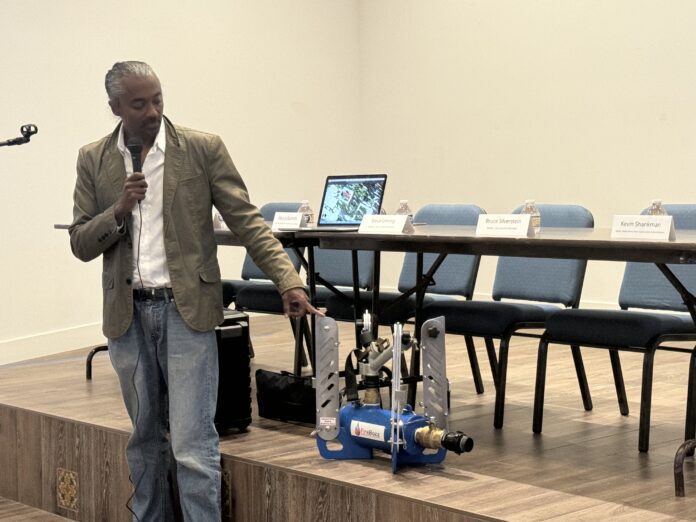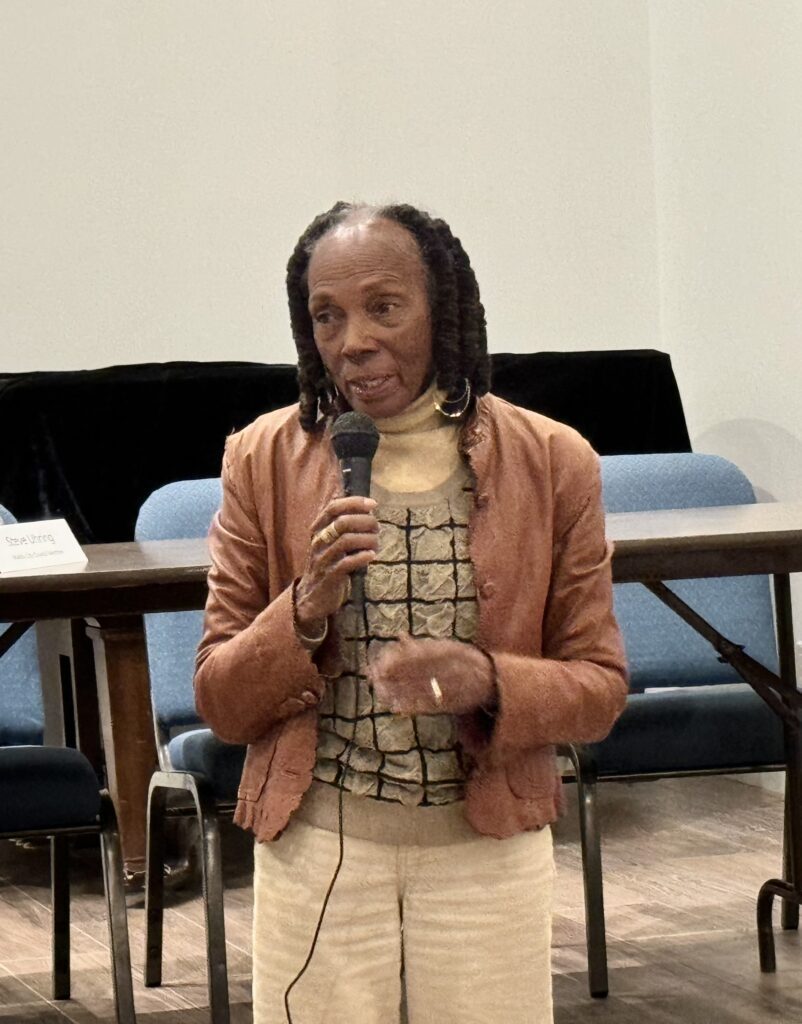
Residents’ association discuss wildfire preparedness and proposal that could strip Malibu of local oversight
The Point Dume Club Residents’ Association convened a general membership meeting for the first time in years on April 23 at the PDC clubhouse to consider and address several matters, the most immediately pressing of which is legislation under consideration by lawmakers in Sacramento which seeks to eliminate local governments’ control over setting rental rates and other policies in mobile home parks statewide.
Guest speaker Kevin Shankman, a commissioner serving on the Malibu Mobile Home Rent Stabilization Commission, explained that under existing law, the Mobile Home Residency Law governs tenancies in mobile home parks and includes provisions that apply to those with an ownership interest in a subdivision, cooperative, or condominium for mobile homes or a resident-owned mobile home park. Among other things, these provisions set forth the rights of residents regarding use of the property. Existing law exempts the rental of certain mobile home spaces by a homeowner, if the mobile home space is not the principal residence of the homeowner and the homeowner has not rented the mobile home to another party, from any ordinance, rule, regulation, or initiative measure adopted by any city, county, or city and county, that establishes a maximum amount that the landlord may charge a tenant for rent.
AB 768, which is currently pending before the Assembly Housing and Community Development Committee, seeks to amend Section 798.21 of the Civil Code, relating to rent protections and local rent control in California’s mobile home parks. The bill would apply the current exemption to the rental of certain mobile home spaces by a homeowner only if the mobile home space is actively held available for sale and it is not the only or principal residence of a homeowner. The practical effect of the bill would be to eliminate local control over matters relating to mobile home parks and rental rates for such communities, Shankman explained, noting that the bill seeks to relegate such decisions to the state because housing is considered a statewide, not a local, issue and the housing shortage in California is significant.
Assemblywoman Anamarie Ávila Farías (D-Dist. 15) introduced the proposal. Avila Faria is a third-generation Contra Costa County resident who was raised by a single mother after her father passed away when she was 3 years old. Her website states that her family dealt with housing insecurity and that she has worked in the housing industry and is an advocate for accessory dwelling units to promote multi-generational affordable housing. She was appointed by former Gov. Jerry Brown and subsequently by Gov. Gavin Newsom to the Board of Directors of the California Housing Finance Agency, which addresses the needs of low- and moderate-income renters and homebuyers by providing financing and programs focusing on housing equity.
Malibu’s Mobile Home Rent Stabilization Commission remains dormant
At the meeting, Point Dume residents expressed extreme frustration that the city has not reactivated its Mobile Home Park Rent Stabilization Commission, a body established years ago to adjudicate any dispute between mobile home park owners and residents. At a City Council meeting on Oct. 14, 2024, mobile home residents urged the commission’s reactivation after the transition from PDC being a family-run operation to being operated by Homeland America, the nation’s largest owner of mobile home parks in the country.
To date, the council has not reactivated the commission. Residents attending the meeting vowed to press the city to do so. Malibu City Councilmember Steve Uhring stated that he is supportive of the residents having reasonable rent and of the reactivation of the commission.
“People who live in mobile homes count too,” Shankman stated. “The council should not only address the concerns of those who live along the ocean and the council should be responsive to PDC residents’ concerns and should immediately reactivate the commission — this meeting is part of your community organizing and demanding action.”
Community Emergency Response Team
At the meeting, longtime Point Dume resident Richard Garvey provided an overview of the Community Emergency Response Team, noting that the team’s volunteers work under the city’s purview, is city-funded, and the city providesCERT with a lot of support.
“Our next CERT training is on May 6 and attendees will be instructed on disaster psychology and first aid,” Garvey said.“The CERT team has gotten a lot of support from the sheriff’s and the team supports the first responders by doing welfare checks during an emergency and assists in any way we can.”
Utilizing a fire suppression system
A representative of Wyesman Wildfire Defense showcased Firebozz, a wildfire suppression system, noting that the equipment, combined with a pump, can be utilized to harness the water in PDC’s pool and its water basin to help defend PDC’s perimeter as well as individual mobile homes. “The Firebozz successfully defended Malibu Jewish Community Center and Synagogue in the Franklin Fire and the Getty is evaluating whether to install our system,” said Ray A. Croney, Wyesman representative. “You can also configure the systems so you can operate them remotely on our app.”
Responding to Croney’s presentation, Candace Bowen, vice president of the PDC Residents Association, opined that PDC should do all it can to prepare to fight the next wildfire, including considering purchasing such fire suppression systems.

We are stronger together with a fire brigade
Keegan Gibbs, director of operations for the Community Brigade Program, explained how the brigade operates. “Having a fire truck in your driveway is not going to happen during a wildfire,” Gibbs said. “The idea behind having a fire brigade is that we are stronger together if we are all trained in fire behavior and in how to fight wildfires and, very importantly, if we take steps to mitigate the danger.”
Gibbs noted that the brigade needs volunteers who are at least 18 years old and are physically fit. He explained that volunteers are trained for 10 weekend days and learn about evacuation protocols, first aid, how to operate fire trucks, and fight fires. “We have six fire trucks and hoses and we are in the process of getting two more trucks,” Gibbs informed. “We also have all the requisite radios for communications and during the Franklin Fire we had 21 people to staff efforts in support of the first responders.”
He explained that during the Franklin Fire, the brigade helped evacuate the Knolls neighborhood and Serra Retreat andduring the Palisades Fire, they helped support response efforts at Sunset Mesa, Big Rock, and Rambla Pacifico. Gibbs noted that the brigade falls under the auspices of the Los Angeles County Disaster Program which provides insurance for volunteers.
“Our community brigade has 50 volunteers and they serve County Line, Malibu West, Point Dume, Corral, Big Rock andHidden Hills. We are growing and are adding brigades in Hidden Hills, Topanga and at County Line,” Gibbs said. “The brigade also helps residents evaluate how to mitigate fire risk through home hardening.” He noted that donations can be made to support the brigade, either through its oversight organization, the Los Angeles Emergency Preparedness Foundation, or at brigade.org.
Bowen noted that before Malibu became a city, the county employed controlled burns for wildfire management. Gibbs responded, “There were plans after the Woolsey Fire to have a controlled burn at Big Rock, but it was canceled and now, 70 percent of Big Rock has burned.”
Bowen urged members to strongly consider starting a PDC brigade and purchasing a fire truck for PDC. She also admonished attendees that, “if we show up at City Council, we can make things happen.”
If signed into law as currently written, AB 768 would effectively eliminate rent control protections for many mobile home spaces in Point Dume Club and Paradise Cove — particularly those not used as a homeowner’s primary residence. Because housing is considered a matter of statewide concern, the bill would override local ordinances, even in charter cities; Malibu, as a general law city, would have no authority to counteract it.
Hometown America, the nation’s largest owner of mobile home parks, is reportedly lobbying in support of the legislation, which could result in significantly increased space rents. In practice, if space rent is no longer capped, landlords may double rental rates. Homeowners who rent out their mobile homes would likely pass those costs along to subtenants, causing further housing instability.
Although four of Malibu’s five city councilmembers have called for a meeting to address the matter, the city manager has yet to schedule one — prompting concern among residents who feel there’s no official city mechanism to respond to mobile home park issues.
Advocates say the bill, in its current form, is deeply problematic but believe there’s potential to amend it in favor of mobile home tenants. The Golden State Mobile Homeowners Group has also been vocal in opposing the measure.



